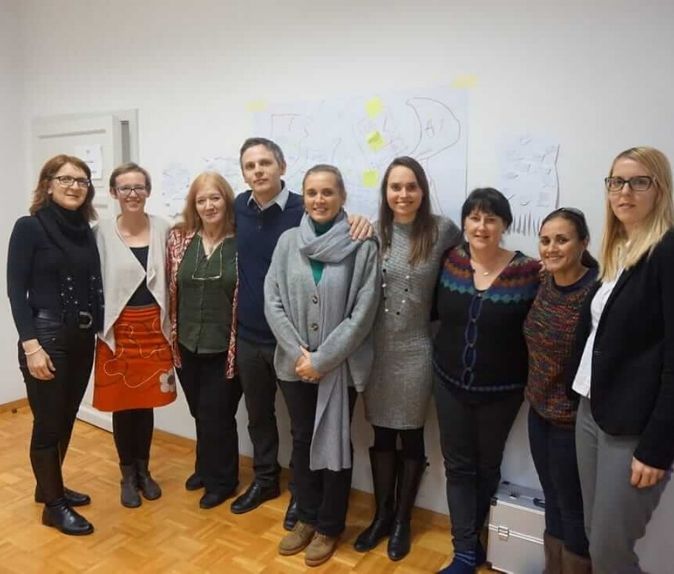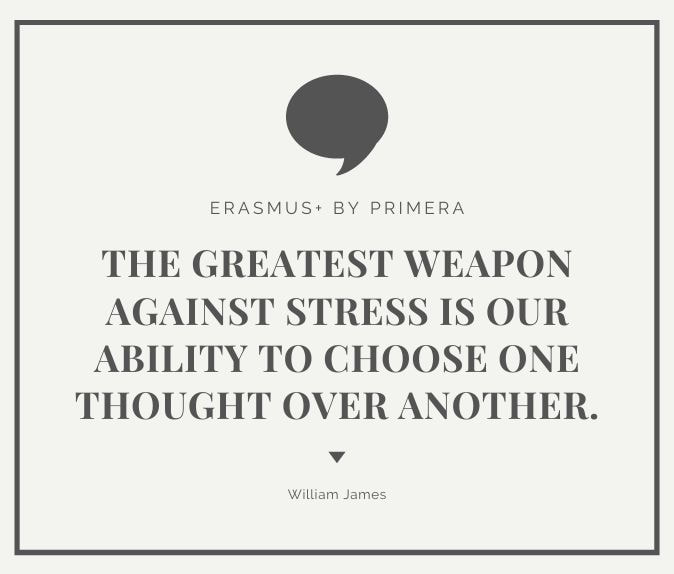Stress Management in SchoolsImprove coping with stress through mindfulness, self-reflection, social support, and cognitive-behavioural model. Teach students the same.
Erasmus+ course summary
Stress, with its specific combination of cognitive, emotional, physical and behavioural response, has a positive and a negative side: a result of a stressful experience can be loss of health, but we can also feel more powerful, resilient and compassionate. Comprehensive (holistic) stress management strategies are important protective factor for successful and satisfying work of teachers and other professions, among which the most widely recognised is mindfulness. Mindfulness helps us to replenish our internal resources and increase our psychosocial hardiness and resilience. When faced with stressful situations in school, it helps us be aware of and connected with whatever is happening inside and around us. On the other side, our diverse competencies will give us strength to initiate change when appropriate. "The stronger person is not the one making the most noise but the one who can quietly direct the conversation toward defining and solving problems." – Aaron T. Beck
Session dates
|
FeaturesRelated |
Mobilize your internal and external resources in stressful situations.
A holistic stress management sees stress not only as a source of a threat but also as an opportunity for progress, mastery and growth.
Course Content
PROGRAMME DAY-BY-DAY
Training usually takes place between 9:00 am and 14:00 pm, followed by after-class activities, that are optional. DAY 1 We start off with an introductory meeting, explanation of practical arrangements and presentation of the participants and timetable. The participants are encouraged to express their expectations, needs and wishes regarding the content of the programme and learning methods. * Understanding characteristics of stress and the stress response. Learning about the effects of stress. DAY 2 Realising ''my patterns'' of stress response. Resources to deal with stress. Strengthening personal resilience and useful resources when working with children. Role of colleague support. DAY 3 Changing stress patterns. Mindfulness: building self-awareness and frustration tolerance in stressful conditions. Mindfulness tools for personal growth. Half-day excursion. DAY 4 Stress management in school: practical perspective. Mindfulness in the classroom. Raising awareness, focus and empathy exercises. DAY 5 Intrinsic motivation. Maintaining and integrating newly learned skills in stress management. Action plan. DAY 6 Concluding activities. Evaluation and feedback. Documentation and certificates of attendance. * Some changes in the programme are possible - the content of the course is always adapted to the participants previous knowledge, expectations and requirements. The participants receive the Informational Booklet a few weeks prior to the start of the course. |
ERASMUS+ COURSES BY PRIMERA
Support a growth mindset of your students by teaching them how to deal with stress.
BLOGS
Read about different perspectives on stress management.
|
Words of Wisdom
|
INTERNATIONAL ERASMUS+ LEARNING WITH PRIMERA
Become a member of Primera's international learning community.
Your network is a family you choose. |








